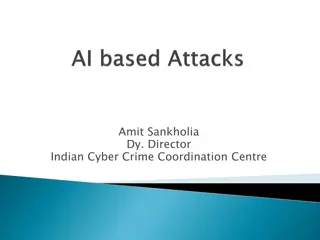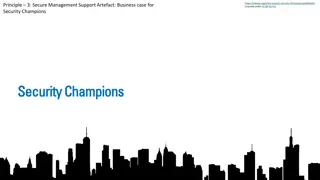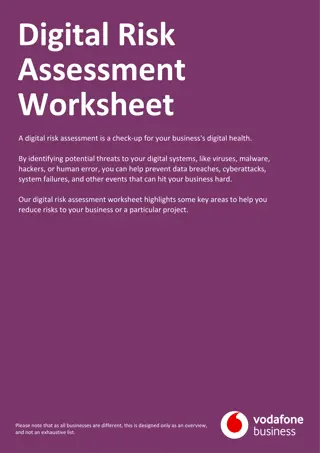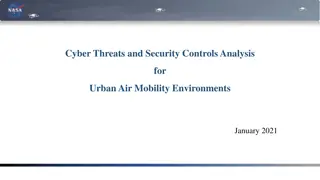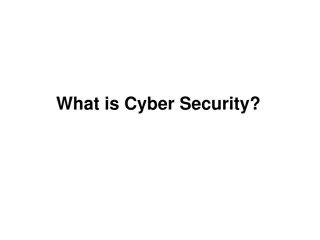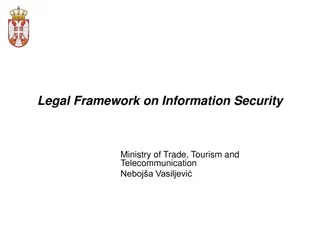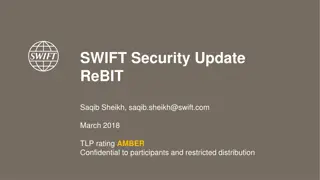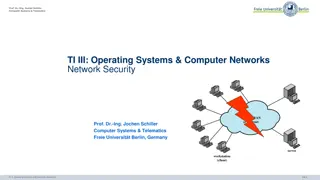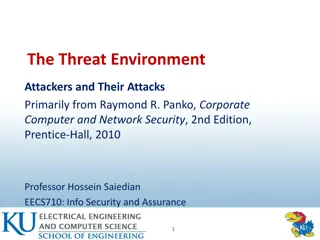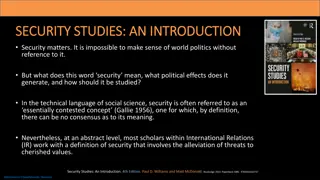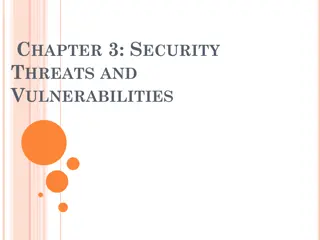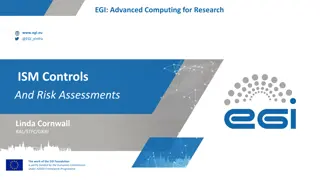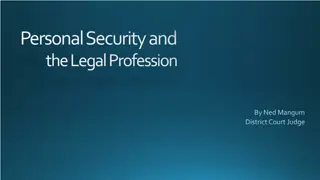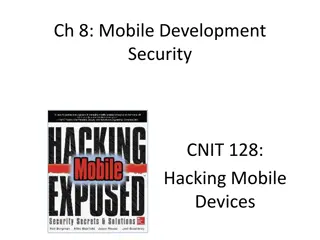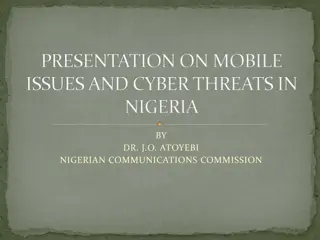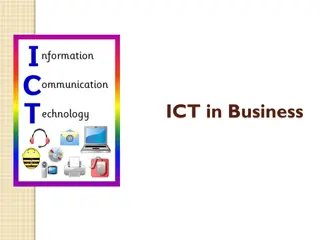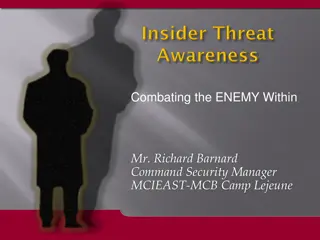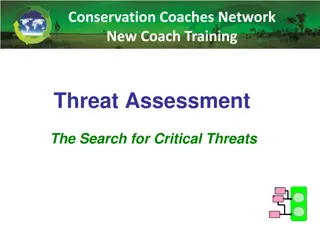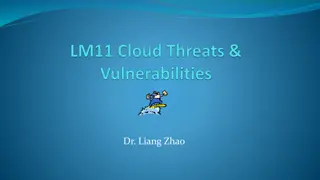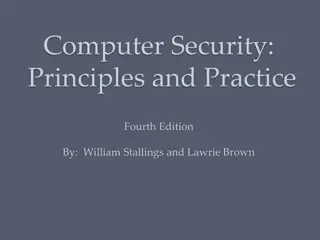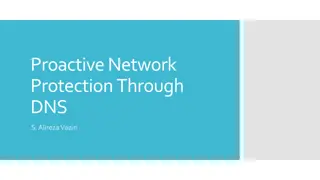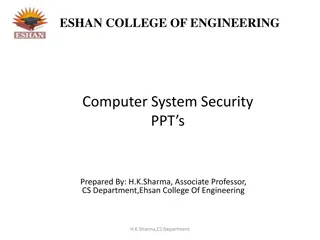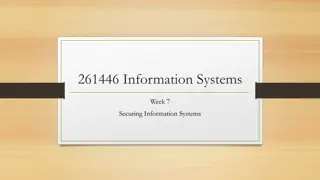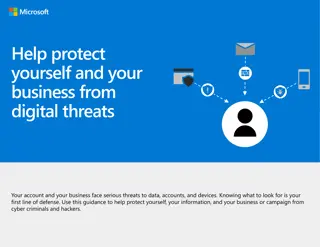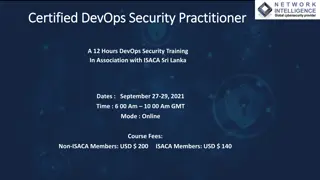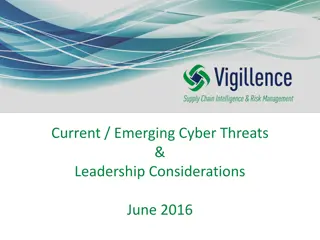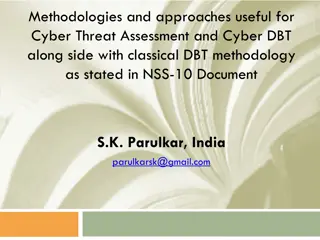Understanding Malicious Attacks, Threats, and Vulnerabilities in IT Security
Malicious attacks, threats, and vulnerabilities in IT systems pose significant risks and damages. This chapter explores the types of attacks, tools used, security breaches, and measures to protect against cyber threats. Learn how security professionals safeguard organizations from malicious attacks
0 views • 24 slides
Artificial Intelligence in Cyber Security: Enhancing Threat Detection and Response
Artificial Intelligence (AI) is revolutionizing cyber security by enhancing threat detection, response, and prevention capabilities. By leveraging machine learning algorithms, AI enables organizations to identify cyber threats, analyze behavioral patterns, automate incident response, adapt to evolvi
1 views • 33 slides
Understanding the Role of Security Champions in Organizations
Security Champions play a vital role in decision-making concerning security engagement, acting as a core element in security assurance processes within a team. They foster a security culture, reduce dependency on the CISO, and promote responsible autonomy and continuous security education in the org
3 views • 13 slides
Comprehensive Digital Risk Assessment Guide for Businesses
Conducting a digital risk assessment is vital for securing your business against threats like viruses, malware, hackers, and human errors. This guide outlines key areas to focus on, such as identifying critical assets, assessing potential impacts of breaches, prioritizing threats, utilizing tools li
3 views • 4 slides
Enhance Your Protection with MDR Cyber Security Services in Dallas
Do you wish to improve your security in Dallas against cyber threats? This is exactly where MDR Cyber Security services from Blackswan Cybersecurity can come in handy. While more complex forms of cyber threats and data breaches are becoming more popular, corporations need to acquire modern security
4 views • 8 slides
Understanding the Roles of a Security Partner
Learn about the roles and responsibilities of a Security Partner, including requesting changes to security roles, approving security requests, and initiating access requests. Explore the overview of Workday Security, the security access request process, and the pre-request process flow. Discover how
1 views • 17 slides
Cyber Threats and Security Controls Analysis for Urban Air Mobility Environments
The Urban Air Mobility (UAM) environment, with its service-oriented architecture, faces various cyber threats related to end-users, cyber-physical systems, cloud services, and on-premise computing. Threats include unauthorized interception of data, phishing attacks, and Denial of Service (DoS) incid
1 views • 9 slides
Challenges in Security Analysis of Advanced Reactors
Analyzing the security aspects of advanced reactors involves considerations such as physical protection, facility sabotage, nuclear terrorism, cyber vulnerabilities, and emerging technologies. Highlighted risks include the need to protect nuclear material, insider threats, terrorist attacks causing
0 views • 8 slides
Understanding Cyber Security and Risks
Cyber security, also known as IT security or computer security, is crucial for safeguarding information systems from theft, damage, and disruption. With the increasing connectivity of devices through the internet, the importance of cyber security cannot be overstated. Cyber risks encompass cyber cri
2 views • 24 slides
Legal Framework on Information Security in the Ministry of Trade, Tourism, and Telecommunication
The legal framework on information security in the Ministry of Trade, Tourism, and Telecommunication, outlined by Nebojša Vasiljević, includes relevant EU legislation such as Regulation No. 460/2004 and Council decisions on network and information security. The EU legislation covers various aspect
0 views • 21 slides
Enhancing SWIFT Security Measures for ReBIT: March 2018 Update
SWIFT's latest security update for the ReBIT program highlights the persistent and sophisticated nature of cyber threats. Recommendations include maintaining vigilance, implementing sound security controls, and leveraging the Customer Security Programme (CSP) pillars for effective cyber threat respo
0 views • 21 slides
Understanding Network Security Threats and Goals in Computer Systems
Explore the concept of threats in communication networks, including examples of attacks such as hacking and data disclosure. Learn about key security goals like confidentiality, data integrity, accountability, availability, and controlled access. Discover technically defined threats like masquerade,
0 views • 32 slides
Coastal Challenges: Threats and Uses Analysis
The Year 9 Geography homework booklet focuses on the topic of coasts, emphasizing grid references and mapping skills. Students are tasked with identifying grid references for shapes, drawing specific shapes on grids, and demonstrating understanding of 4 and 6 figure grid references. Additionally, in
0 views • 13 slides
Understanding Security Threats and Countermeasures
Explore the diverse threats posed by attackers in the information security landscape, ranging from employee sabotage to hacking incidents. Learn about fundamental security terminology, types of security compromises, and countermeasure strategies to prevent, detect, and correct security breaches. Gai
0 views • 32 slides
Understanding Security in World Politics
Security studies delve into the intricate processes of defining and addressing security threats in global politics. It explores the contested nature of security definitions, emphasizes the political significance of security, and challenges the conventional boundaries of International Relations. The
0 views • 8 slides
Understanding Security Threats and Vulnerabilities in Computer Systems
In computer security, threats exploit vulnerabilities to breach security and cause harm. Vulnerabilities arise from system weaknesses, attacker access, and capability. Threats include spoofing, data tampering, repudiation, information disclosure, denial of service, and elevation of privilege. Catego
0 views • 13 slides
Risk Management and Security Controls in Research Computing
The European Grid Infrastructure (EGI) Foundation conducts risk assessments and implements security controls in collaboration with the EOSC-hub project. The risk assessments involve evaluating threats, determining likelihood and impact, and recommending treatment for high-risk threats. Results from
0 views • 13 slides
Enhancing Personal Security in the Legal Profession: Threats, Laws, and Strategies
This presentation by Ned Mangum, a District Court Judge, sheds light on the importance of personal security in the legal profession. It covers laws related to personal security, common misconceptions, civil and criminal law aspects, real-life examples of violence against lawyers, and strategies to e
0 views • 20 slides
Mobile App Security Threat Modeling and Mitigation
Explore mobile app security threats, learn how to conduct threat modeling exercises, and implement mitigation strategies. Discover built-in security features, threat modeling technologies, and common threats like malware and code injection. Enhance your understanding of app security constraints and
0 views • 63 slides
IPv6 Security and Threats Workshop Summary
David Kelsey from STFC-RAL presented on IPv6 security and threats at the IPv6 workshop pre-GDB at CERN in June 2016. The workshop covered topics such as IPv6 protocol attacks, issues for site network security teams and sys admins, new features of IPv6, security pros and cons, immediate IPv6 concerns
0 views • 29 slides
Mobile Issues and Cyber Threats in Nigeria - Presentation by Dr. J.O. Atoyebi, NCC
Evolution of GSM in Nigeria, the impact of mobile phone deregulation, and the rise of cyber threats highlighted in a presentation by Dr. J.O. Atoyebi of the Nigerian Communications Commission. The report reveals Nigeria's position in global internet security threats and the challenges faced by the c
0 views • 7 slides
Understanding Computer Threats and Security Measures
Computer threats are constantly evolving, posing risks such as unauthorized access, data manipulation, and cyber-attacks. This chapter discusses various types of threats to users, hardware, and data security measures to mitigate these risks. Learn about identity theft, malware, cyber terrorism, and
0 views • 21 slides
Nuclear Security and Regulatory Oversight in the Slovak Republic
The Nuclear Regulatory Authority of the Slovak Republic is addressing new challenges in nuclear security, including threats such as drones and cyber attacks. They are working on updating legislation and implementing countermeasures to safeguard nuclear facilities. The focus is on enhancing cyber sec
0 views • 17 slides
Recognizing and Preventing Insider Threats in National Security
Insider threats pose a significant risk to national security and industry, involving individuals using authorized access to carry out harmful actions. This content covers the definition of insider threats, indicators, consequences, and ways to recognize and report suspicious behaviors. It emphasizes
0 views • 15 slides
Understanding Threat Assessment in Conservation: Direct, Stress, and Indirect Threats
Within threat assessment for conservation, different types of threats are identified and categorized, including direct threats which are human-induced actions directly affecting conservation targets, stressors which result from biophysical impacts of actions on targets, and indirect threats contribu
0 views • 24 slides
Understanding Cloud Security Threats and Vulnerabilities
Explore the world of cloud security through the eyes of Dr. Liang Zhao, focusing on mobile security, WLAN security, and cloud threats. Learn about threat modeling, mitigating cloud vulnerabilities, and common threats such as data leakage, insecure interfaces, and more. Discover practical threat anal
0 views • 18 slides
Automating Security Operations Using Phantom
Isabella Minca, an intern for 4 months in the Security Team at Adobe, presents an overview of automating security operations using Phantom. The presentation covers goals, security alerts, Phantom playbooks, handling security data, and the capabilities of Phantom in orchestrating security responses.
0 views • 28 slides
Understanding Malicious Software in Computer Security
In "Computer Security: Principles and Practice," the chapter on Malicious Software covers various types of malware such as viruses, adware, worms, and rootkits. It defines malware, Trojan horses, and other related terms like backdoors, keyloggers, and spyware. The chapter also discusses advanced thr
0 views • 49 slides
Proactive Network Protection Through DNS Security Insights
Exploring proactive network protection methods using DNS, security challenges, botnet threats, firewall management, malware controls, and DNS-based malware control. Discussions on DNS security vulnerabilities, DNSSEC, threat intelligence, machine learning, and best practices like RPZ for DNS protect
0 views • 29 slides
Understanding Cyber Threats in Today's Digital Landscape
Cyberspace is a vast realm encompassing the Internet, where we engage in various activities ranging from communication to entertainment. With the majority of children exposed to the online world, cybersecurity awareness is crucial to tackle the rising cyber threats. These threats include job frauds,
0 views • 33 slides
National Security Challenges and the Road Ahead
General Barry R. McCaffrey, a retired four-star General, discusses long-term international security challenges including Chinese naval and air power in the South China Sea, North Korean threats, Iranian threats, Russian border expansion, cyber-threats, nuclear proliferation, international terrorism,
0 views • 13 slides
Understanding Web Security: Threats and Protections
Exploring the landscape of web security through discussions on historical vulnerabilities, top web threats, browser security models, and the goals of web security. Delve into the world of web programming, security threat models, and learn about the goals and importance of maintaining a secure web br
0 views • 74 slides
Understanding Computer System Security Threats and Malware Types at Eshan College of Engineering
Explore the world of computer system security threats and malware at Eshan College of Engineering through insightful presentations prepared by Associate Professor H.K. Sharma from the CS Department. Learn about security threats like intrusion, phishing, spyware, spam, and malware categories such as
0 views • 13 slides
Securing Information Systems: Threats, Controls, and Solutions
Explore the critical aspects of securing information systems, including system vulnerabilities, business value of security, framework establishment, security technologies, case studies, security policies, threat identification, internet and wireless risks, malicious software, and more. Learn about u
0 views • 27 slides
Safeguard Your Business from Digital Threats
Protecting yourself and your business from digital threats is crucial in today's cyber landscape. Learn how to control your information, recognize security threats like malware and phishing, and take proactive measures to enhance your online security defenses. By following these guidelines, you can
0 views • 5 slides
Understanding Experiments and Threats to Validity
Explore the world of experimental research, internal and external validity, threats to validity, and the importance of proper study design in ensuring the credibility of research results. Learn about confounding variables, threats to internal validity such as environmental factors and group comparis
0 views • 15 slides
Comprehensive DevOps Security Training Overview
This Certified DevOps Security Practitioner course provides a deep dive into implementing DevSecOps, integrating security into the DevOps processes. Covering topics like security testing, Docker security, automation, and more, the training aims to equip participants with the necessary skills to embe
0 views • 5 slides
Navigating Current and Emerging Cyber Threats: Leadership Insights
Delve into the realm of current and emerging cyber threats with a focus on leadership considerations. Understand the evolving landscape of cyber risks, the importance of cyber expertise in leadership planning, and the essential role of cybersecurity in today's digital world. Explore the various thre
0 views • 16 slides
Understanding Threats and Attacks in Information Systems
Threats and attacks pose risks to information systems through vulnerabilities that can be exploited, leading to data loss, system unavailability, and compromised security. Four primary classes of threats include unstructured threats from inexperienced individuals, structured threats from skilled hac
0 views • 21 slides
Comparison of Traditional and Cyber Threat Assessment Methodologies
In the digital age, understanding cyber threats alongside traditional threats is crucial. Cyber adversaries operate globally and are hard to identify, posing challenges for intelligence agencies. The ease of acquiring cyber skills and resources makes cyber threats dynamic and dangerous. Classical cy
0 views • 17 slides

